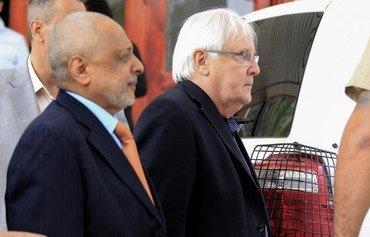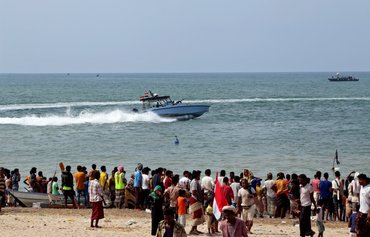ADEN -- Saudi Arabia on Monday (March 22) offered the Iran-backed Houthis (Ansarallah) a "comprehensive" UN-supervised ceasefire, as part of a series of fresh proposals aimed at ending the six-year conflict.
But the Houthis swiftly dismissed the initiative, which comes as they escalate attacks on the kingdom and push to seize the Yemeni government's last northern stronghold.
The initiative includes "a comprehensive ceasefire across the country under the supervision of the United Nations", a Saudi government statement said.
Riyadh also proposed reopening the international airport in Sanaa, and restarting political negotiations between the Yemeni government and the Houthis, the statement added.
![Arab coalition spokesman Col. Turki al-Maliki speaks during a press conference in Riyadh on March 22. Saudi Arabia offered the Houthis a "comprehensive" ceasefire, among a series of proposals aimed at ending a catastrophic six-year conflict. [Fayez Nureldine/AFP]](/cnmi_am/images/2021/03/23/29055-Arab-coalition-spokesman-600_384.jpg)
Arab coalition spokesman Col. Turki al-Maliki speaks during a press conference in Riyadh on March 22. Saudi Arabia offered the Houthis a "comprehensive" ceasefire, among a series of proposals aimed at ending a catastrophic six-year conflict. [Fayez Nureldine/AFP]
![Smoke billows during clashes between pro-government forces and the Iran-backed Houthis (Ansarallah) in Yemen's Marib province on March 5. [AFP]](/cnmi_am/images/2021/03/23/29058-Yemen-war-Marib-600_384.jpg)
Smoke billows during clashes between pro-government forces and the Iran-backed Houthis (Ansarallah) in Yemen's Marib province on March 5. [AFP]
The kingdom's plan also called for depositing taxes and customs revenue from ships carrying oil to the Red Sea port of al-Hodeidah -- a key conduit for desperately needed aid -- in a joint account of the Yemeni central bank.
"We want the guns to fall completely silent," said Saudi Foreign Minister Prince Faisal bin Farhan.
"The initiative will take effect as soon as the Houthis agree to it," he added, hailing it as "an opportunity to end the crisis" in Yemen.
Yemeni support for initiative
"The Saudi initiative confirms that the Arab coalition is backing the government of Yemen in its efforts to restore the state and establish peace," said Yemen's Deputy Minister of Human Rights Nabil Abdul Hafeez.
The Yemeni government has welcomed the initiative in order to end the war, alleviate human suffering and ensure the payment of public sector salaries, said government spokesman Rajeh Badi.
"These same measures would serve the interests of the Houthis even more, as they would alleviate the suffering of people in their areas," he said.
"I call upon the Houthis to return to the language of reason and logic and work towards ending the six-year long suffering of our people," he added.
Badi said the Houthis' rejection of the initiative is for the purpose of political bargaining, and "is aimed at exercising more pressure to impose more conditions" that mainly serve their interests at the expense of the Yemeni people.
According to political analyst Ali al-Sarari, the Houthis' decision is not in their hands, but in Iran's hands.
"This is the reason behind the continuation of human suffering and the war, because Iran is dealing with the situation in Yemen as a bargaining chip to implement its own agenda as part of the ongoing nuclear deal negotiations," he said.
Al-Sarari is referring to international efforts to discuss Iran's return to compliance with the 2015 nuclear deal, known as the Joint Comprehensive Plan of Action (JCPOA).
So far Iran has rebuffed these efforts.
"The Saudi initiative is in line with the US and UN efforts to stop the war and establish peace, and the Houthis have to deal positively with it and to give priority to the interests of the Yemeni people," al-Sarari said.
Ceasefire in Houthis' hands
Under the Saudi proposal, the ceasefire would enter into force when the Houthis say they accept it, said Yemeni army spokesman Brig. Gen. Abdo Majali.
The implementation of the initiative is now in the Houthis' hands, he said.
"The Yemeni Ministry of Defence backs the government in its acceptance of the initiative," he added.
By re-opening al-Hodeidah port for ships carrying oil derivatives under the new ceasefire agreement, human suffering will be alleviated, said economist Abdul Aziz Thabet.
Bringing the crisis to an end will lower the price of oil derivatives, which in turn will be reflected in the prices of all other products, he said.
Meanwhile, he added, collecting taxes on oil derivatives "will help pay the public sector employees' salaries in Houthi-controlled areas".
"Such measures would have a clear impact on alleviating the humanitarian crisis."
Potential catastrophe for civilians
The latest proposal follows a renewed push by the new US administration of President Joe Biden to revive stalled peace talks.
The United States has condemned a recent spike in Houthi drone and missile attacks on Saudi Arabia.
A drone strike sparked a fire at a Riyadh oil refinery on Friday, in the second major assault this month on Saudi energy installations claimed by the Houthis.
On Sunday, Saudi Arabia began naval drills in the Arabian Gulf in a bid to boost the security of its oil fields, state media said, adding that energy giant Saudi Aramco took part.
The Houthis also are battling towards Marib. Over the weekend, Arab coalition warplanes pounded Houthi bases and provided support to pro-government forces battling a quickening Houthi advance.
The loss of Marib would threaten catastrophe for civilians, including at least one million displaced people sheltering in the region, many in camps in the surrounding desert.
The UN warned last month of disastrous consequences for civilians if the fight for Marib continues.

![Houthi militiamen sit in the back of a pick up truck on March 23, 2021 in Sanaa. [MOHAMMED HUWAIS / AFP]](/cnmi_am/images/2021/03/23/29066-000_96k72n-600_384.jpg)






